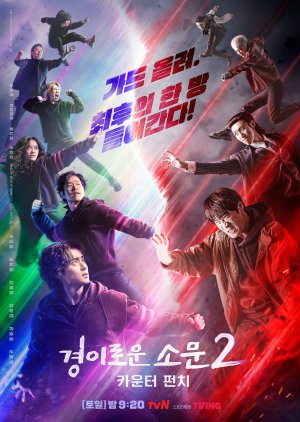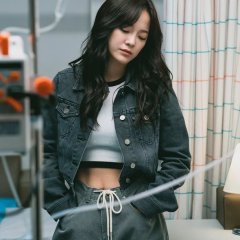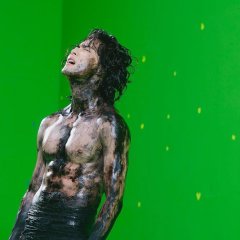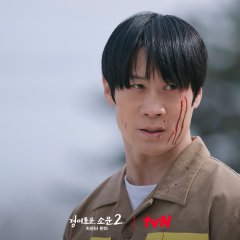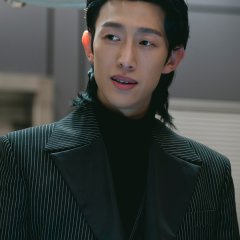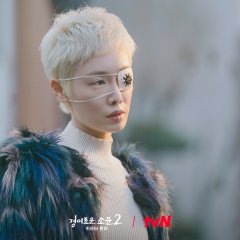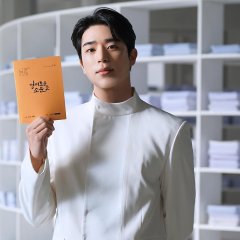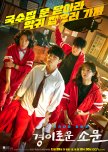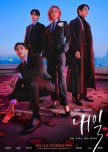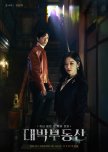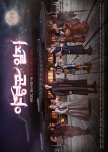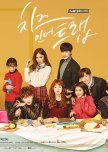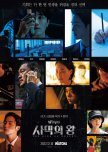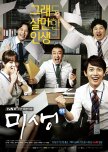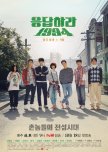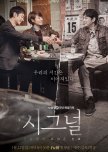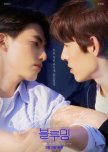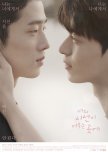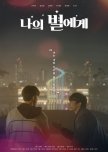 Kim Hi Eo Ra's agency gives update about the actress' school violence controversy
Kim Hi Eo Ra's agency gives update about the actress' school violence controversy Des chasseurs de démons aux capacités différentes traquent ensemble les mauvais esprits qui provoquent le chaos parmi les humains. Afin de garder leur activité secrète, ils tiennent un restaurant sans prétention. (La source: DramAsia World de MyDramaList) ~~ Adapté du webtoon "Amazing Rumor” (경이로운 소문) par Jang Yi (장이). Modifier la traduction
- Français
- ภาษาไทย
- Українська
- Español
- Titre original: 경이로운 소문2: 카운터 펀치
- Aussi connu sous le nom de: Kyeongirowoon Somoon 2 , The Uncanny Counter Season 2 , Demon Catchers Season 2 , A Wonderful Rumor Season 2
- Scénariste: Kim Sae Bom, Yeo Ji Na
- Réalisateur: Yoo Seon Dong
- Genres: Action, Mystère, Comédie, Surnaturel
Distribution et équipes
- Jo Byung Kyoo Rôle principal
- Yoo Joon Sang Rôle principal
- Kim Se Jung Rôle principal
- Yeom Hye Ran Rôle principal
- Ahn Suk HwanChoi Jang MoolRôle principal
- Yoo In SooNa Jeok BongRôle principal
Critiques

Disappointing! Feels drastically different from S1
I am really disappointed. I watched Season 1 shortly before Season 2 came out and was super excited. The Teasers looked promising and the cast looked fantastic in their new styles. Especially So Mun with the longer curly/wavy hair. Cho Byeong Kyu can shape-shift with his different hairstyles. But styling and looks is not enough to create a great follow-up season.Where this season went wrong:
- The comedy is over the top and not my taste. Especially because it wasn't like this in S1
- The dynamic between the characters feels different as well. Less serious.
- The tone of this season is generally different from season1 and not in a good way. S1 was more personal and serious
- The Plot was running in circles. So much that it was getting draggy and boring.
- They wasted Yoo In Soo. His character was really annoying. I thought it would get better after ep 3&4 but it did not
- I don't know why, but it just felt hollow
If you do a second season with a different tone etc. ... do it at least good. Not like this.
Cet avis était-il utile?

Marshmallow-Chocoholic
101 personnes ont trouvé cette critique utile
Cette critique peut contenir des spoilers
Uncanny Counter 2; A Disappointing Follow-Up To A Brilliant Series…
When Uncanny Counter hit our small screens back in late November 2020, viewers were in for a great treat under the writing of Yeo Ji Na . The series was filled with intriguing characters, lore and high stakes to keep the plot engaging and well-written. What was delivered to our screens in 2023 left a lot to be desired, not just straying from the original webcomic, but being poorly written.The basic plot premise of the second season returns to our ragtag group of heroes, The Counters. Now slightly older, Mun ( Cho Byeong Kyu) has begun helping to train the other counters. Ga Mo Tak ( Yoon Joon Sang) has doubled up as a cop and Counter to help the team, while Do Ha Na ( Kim Se Jeong) and Chu Mae Ok ( Yeom Hye Ran) are left to harness their powers.
However, trouble is soon on the horizon when a trio of evil spirits Hwang Pil-Gwang ( Kang Ki Young), Gelly Choi ( Kim Hieora) and Wong ( Kim Hyun Wook) become an increasing threat to the counters. With the help of new Counter Na Jeok-Bong ( Yoo In Soo), the heroes find themselves running into more problems than one, especially for Mun and his friend Ma Ju-Seok’s (Jin Sun-Kyu)‘s journey down a dark path…
To understand where one of the major issues of the show lies, I think it is essential for us to address the writing change. Yeo Ji Na’s talents as a writer really shone through in season one. Her ability to address complex issues and themes, as well as facilitate them to shape our characters made the series engagingly dark, comical yet also filled with mystery and adrenaline. The story had stakes because the main villain was threatening and similar to Mun, viewers were new to the world of Counters and learnt about the lore and world of spirits along the way. It made the story engaging and proved Ji Na to be a talented writer.
After season one and for various conflicting and directional reasons, Kim Sae Bom took over from Yeo Ji Na as the main writer for season two in production. Kim Sae Bom, most likely standing out for his involvement as a screenwriter for Bad and Crazy, has a very different approach to writing than Ji Na even from the offset. Is this a crime in itself? No. In fact, the initial premise of season two did seem quite interesting alongside theme shifts, especially with new characters introduced onto the field. So where did things go wrong with Sae Bom’s writing? The big issue lay with the plot and character changes feeling jagged and convoluted , as well as the evident decline of writing between seasons.
Season one was well-balanced between themes of action, angst, friendship, supernatural and aspects of tragedy. It was far from a flawless masterpiece ( and did struggle a little with balance in places), but it was self-aware of its themes and characters. Season two tries to mimic a “ similar balance” in the mould of a mystery comedy setup. The fights are still there , but while the action is present, the emotional deliverance leaves a lot to be desired, even from the balance of themes. This resulted in a notable struggle with the writer attempting to imitate Ji Na in his own style while falling short of being a decent copy. As a consequence, witty jokes from season one turning into toilet jokes ( repeatedly) and yelling random English phrases to enact as the comic relief of the series.
When the series attempted to take a darker turn in parts, it struggled a lot to be poignantly reflective as the previous season. A mixture of sloppily rushed writing ( particularly out of character choices) as well as questionable connection with the audience, did often make these scenes feel more arduous than moving. ( One of the best examples being early on when we see the guardians first reunite with their Counters. Considering the emotional impact of their challenges throughout the first season, the cheesy happy family moments between the characters was somewhat out of place. It gave little opportunity to reflect on the actual development in the relationship between the Counters and their guardians from the previous season.)
The acting of the series was admittedly a little mixed. Although the series has a good cast and some brilliant names introduced into the lineup , a mixture of overreacting and wooden dialogue did have a big part to play with some more cringe-inducing scenes . Some noteworthy performances did come through Seo Byeok-joon as Park Do-hwi, Ha Na’s first love, and Hong Ji Hee as Lee Min Ji, the tragic wife of Ju Seok, in particular. Both actors delivered good performances as their respected characters, even if the writing did not give their onscreen personas full justice.
Character writing is another mixed bag. Main lead Mun stands out in particular as the epitome of the show’s changed writing quality between seasons. In season one, Mun was very much the tragic bullied teen, who goes through a lot of character growth from naivety to teen angst ( mixed with powerful abilities) and then to genuine acceptance of his circumstances . He stood out as a fairly good protagonist because he changed and grew a lot from beginning to end, while still remaining true to himself. In season two, Mun is noticeably different from his earlier counterpart.
Of course, he is meant to be older and thus a little different from his teen self, but the more noticeable traits of Mun being somewhat anxious at times and fairly defiant, is changed for him playing the role of the comic man in the first- half . It isn’t necessarily bad seeing Mun grow out of his shell, but it felt odd considering how much Mun’s noteworthy personality traits were not carried over more in season two, especially by replacing a key aspect of Mun’s personality as a fairly reserved individual. In particular, season one featured heavily on Mun’s deep bonds with only a few people in his life. He needed deep connections with people such as his two best friends and grandparents ( and eventually the Counters) to form genuine relationships. These were important parts of Mun’s life and helped him to carry on. In season two, while these characters do feature in some background scenes, it was beyond out of character to see Mun having such a “deep” bond a practical stranger. It did not reflect Mun as an individual, and even more disappointingly, did not convey the character we had come to love through his gradual growth.Episode eight and nine attempted to offer a “ twist” to Mun’s circumstances, but having already repeated the same concept from season one, it felt a little overused . Perhaps the only good aspect we saw through this “ twist” came through an opportunity to see some more traumatic sides to Mun’s inner-self, as well as his strong bond with Ha Na coming to light. However, the resolution to this convoluted “ development” episode was both rushed and incredibly sappy, giving little opportunity to actually explore Mun’s darker and more difficult issues at heart and growth.
Then there’s the other counters. Mo-Tak was beloved in season one for being the sarcastic “cool guy”, who helps out Mun. The fact that Mo Tak was going to play a bigger role in season two gave so much potential for this character, yet, rather than giving him an opportunity to be developed further , the show rendered him as the show’s jester; often spending most of his time making unfunny jokes and being the butt of someone’s jokes. To add insult to injury, there was also the attempt to weaken the previously strong fighting abilities of Do Ha Na and Chu Mae Ok. Considering their poignant backstories and strength, it was sad to see them being put on the back burner for most of the show . The series did attempt to offer some “ intriguing” aspects with Ha Na’s first love ( one of the few good aspects of this second season) and she did feature in some later episodes, as well as Mae Ok with her son, but aside from that, they were rarely given as much exposure as within the previous season. Choi Jang-Mul ( Ahn Suk Hwan) features again in the series, though while in season one he was the comical rich man (with a not-so secret crush on Mae-Ok), in season two he plays more of the role as a clown in some of his featured scenes.
Then there’s the new counter Na Jeok Bong ( Yoo In Soo), arguably one of the show’s greatest letdowns. Yoo In Soo is a good actor, but even he cannot entirely save his character from failing. Jeok Bong is meant to be the definition of the “ fool with a hero’s heart”. He is beyond awkward and useless at fighting, but he is seemingly a “good person”. The problem with Jeok Bong is that the writing confuses creating the unlikely and foolish hero with being likeable as playing the useless fool all the time. Rather than seeing Jeok Bong gradually grow or develop into a better person ( even through nuanced scenes like comforting others, or be given a more difficult issue to face ) he is still played out to be the fool for most of the series. Instead, a never -ending cycle of toilet jokes and failing fights pretty much encapsulates this character’s screen time time and time again . Whether the writers didn’t want Jeok Bong to grow from out of Mun’s shadow or be the “comic relief”, it is hard to say, but the writing direction this character was taken in was a sad reflection of wasted potential, questioning why another counter was even introduced in the first place . ( Aside from plot fodder.)
The villains of the series were unintentionally a little mixed. Their initial introduction did hold a lot of potential; a trio of nefarious evil spirits who gain Counter powers and are not afraid to kill others in their wake. The problem is that while they are played by very good actors, their characters struggle to be well-developed threats . In season one, the big bad of the series was just that; evil to the core and driven to complete his goals of bringing destruction and ruining the Counters . In season two, it’s hard to really work out what the trio actually wants aside from some measly power grabs here and duped powers . Sure, they want to stop the Counters from getting in their way, but where are the true stakes? Why are they so fixated on them to the point of going as far as they have done? What are their true goals aside from just being plot devices? As antagonists, they are fairly “evil”, just not particularly with a sense of impending threat or being a true foil for the Counters. The stakes could have been there, but season two does little to make them an imminent antagonistic force beyond obvious “ plot drive”. This is sad considering the fact that especially Hwang Pil-Gwang, as the leader of the trio, could have been a really interesting character if he had been developed properly as early hints suggested. Gelly Choi did get her moments later in the spotlight by proving that she is quite devious, but considering her featured screen time, Gelly and Wong were certainly underdeveloped and underused .
Last but not least with characters, it is hard not to mention Ma Ju-Seok, one of the show’s most divided characters for viewers. On paper, Ju Seok had a really interesting role; a “ nice guy” driven to the edge and Mun trying to help him. On the other hand, Ju Seok was simply a cause for plot rather than well-developed. One of his major flaws came through his “ deep bond” with Mun. The show constantly forces the message that Ju-Seok is a “good “guy, but the series forgets a key point in writing: show don’t tell. Rather than showing us these acts ( aside from helping Mun’s grandmother in some scenes ) we constantly hear the same narrative in dialogue that Ju Seok is a “nice person”, but not through very sincere actions or scenes in particular. To make it stranger, Mun is established to be intimate with a small circle of his family and friends, and takes time ( as shown with the Counters) to really develop intimate bonds. It makes little sense for Mun to suddenly trust Ju Seok on such a level ( helping his grandmother or not), without actually getting a sense of what has really drawn them to form such a friendship. For example, had Ju Seok played a role in scenes as an older brother/ uncle figure by encouraging Mun in other respects , then maybe this relationship would have been more poignant, or at least viewers could understand some of Mun’s trust in such a character . Instead, it rarely delivered the full intimacy it was suggesting, making it an odd spectacle to see Ju Seok try and go dark-side and for Mun to be so set on helping a near stranger . Ju Seok’s “ character arc” did have somewhat of a resolution, though it was rushed.
Perhaps the few strengths of this second season came through showing Mun’s darker issues ( though not in resolution), as well as the return of Mun’s friends Kim Woong-min ( Kim Eun Soo) and Im Ju Yeon ( Lee Ji Won). Although very much background characters, their teasing potential romance between the two characters: as well as their long-standing friendship with Mun, did provide quite fun and heartwarming in most of their featured scenes. Another minor character, Park Do-hwi ( Seo Byeok-joon), Ha Na’s first love, was also quite a delight. ( The series did seriously go about a very cliche way of his resolution , but his featured screen time was certainly engaging .)
The other issue at hand comes through execution. To put it simply, Uncanny Counter 2 struggles with pacing a lot. The major part of the series nearly drags along at a snail’s pace, trying to place some action in training montages and some villain scenes to lead up to the “ big showdown” . Later episodes did bit up the pace slightly and were slightly more engaging with the plot and some themes , but most episodes, especially the first-half, felt underdeveloped and quite repetitive. The ending was probably one of the show’s greatest letdowns. It certainly brought a bittersweet note for the show, but last minute plot points, which could have easily have flourished and been developed earlier on, were rushed and thrown in for quick angst. This lead the resolution to feel a little unresolved.
The directing of the series under director Yoo Soo Deong follows a fair sleek and basic cinematography. The CGI is decent enough, though compared to some of the more sleek palettes in season one, there is a little left to be desired for the eyes. The OST was okay; there were some good songs such as CRAVITY “Ready, Set Go” which helped set the mood in some scenes, and was quite catchy too.
Overall, Uncanny Counter 2 is not quite on the same level as its previous season both across the writing range and execution. It is understandable the show wanting to go in a different direction. Mun is no longer the naive kid we saw in season one, and has begun to grow beyond playing “ the heroic role” all the time. However, the way the show tried going about this with poor writing decisions made Uncanny Counter 2 feel a little rushed and convoluted in parts. There are definitely a few good aspects to the season , including accessibility to viewers who have not watched the previous part as well as some interesting characters and general setups . However, poor pacing did make this season feel out of place across thematic and writing styles. Overall, okay for a quick binge watch but that is about it.
Cet avis était-il utile?

